2014新目标春季八年级下册Unit_10_I’ve_had_this_bike_for_three_years.
- 格式:doc
- 大小:85.50 KB
- 文档页数:9
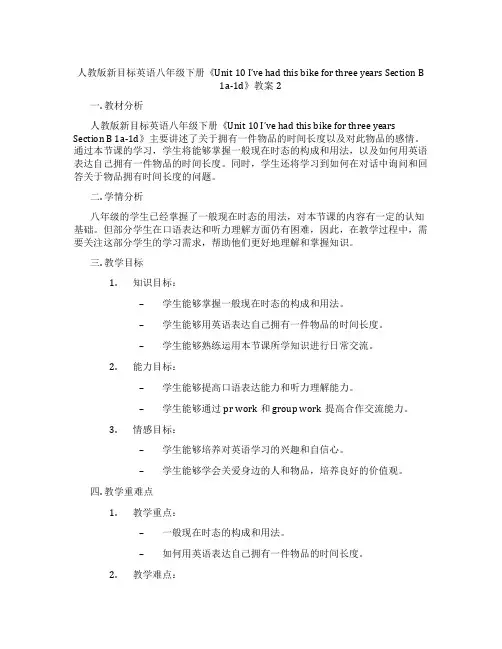
人教版新目标英语八年级下册《Unit 10 I’ve had this bike for three years Section B1a-1d》教案2一. 教材分析人教版新目标英语八年级下册《Unit 10 I’ve had this bike for three years Section B 1a-1d》主要讲述了关于拥有一件物品的时间长度以及对此物品的感情。
通过本节课的学习,学生将能够掌握一般现在时态的构成和用法,以及如何用英语表达自己拥有一件物品的时间长度。
同时,学生还将学习到如何在对话中询问和回答关于物品拥有时间长度的问题。
二. 学情分析八年级的学生已经掌握了一般现在时态的用法,对本节课的内容有一定的认知基础。
但部分学生在口语表达和听力理解方面仍有困难,因此,在教学过程中,需要关注这部分学生的学习需求,帮助他们更好地理解和掌握知识。
三. 教学目标1.知识目标:–学生能够掌握一般现在时态的构成和用法。
–学生能够用英语表达自己拥有一件物品的时间长度。
–学生能够熟练运用本节课所学知识进行日常交流。
2.能力目标:–学生能够提高口语表达能力和听力理解能力。
–学生能够通过pr work和group work提高合作交流能力。
3.情感目标:–学生能够培养对英语学习的兴趣和自信心。
–学生能够学会关爱身边的人和物品,培养良好的价值观。
四. 教学重难点1.教学重点:–一般现在时态的构成和用法。
–如何用英语表达自己拥有一件物品的时间长度。
2.教学难点:–一般现在时态的运用,特别是在实际语境中的运用。
–听力理解能力,尤其是对含有细节信息的听力材料的理解。
五. 教学方法1.任务型教学法:通过设置各种任务,激发学生的学习兴趣,提高学生的参与度。
2.交际型教学法:通过模拟真实场景,让学生在实际语境中运用所学知识,提高口语表达和听力理解能力。
3.小组合作学习:鼓励学生相互讨论、交流,培养合作精神和团队意识。
六. 教学准备1.教学材料:人教版新目标英语八年级下册教材。
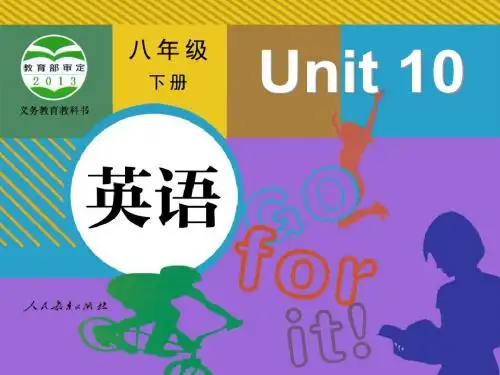
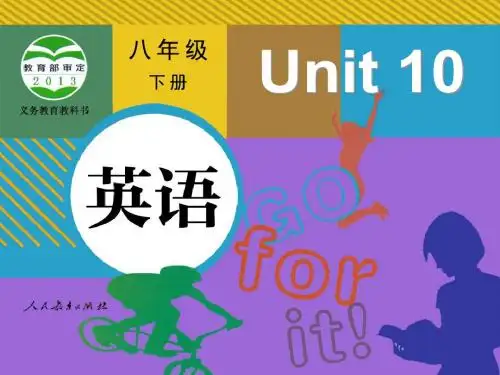
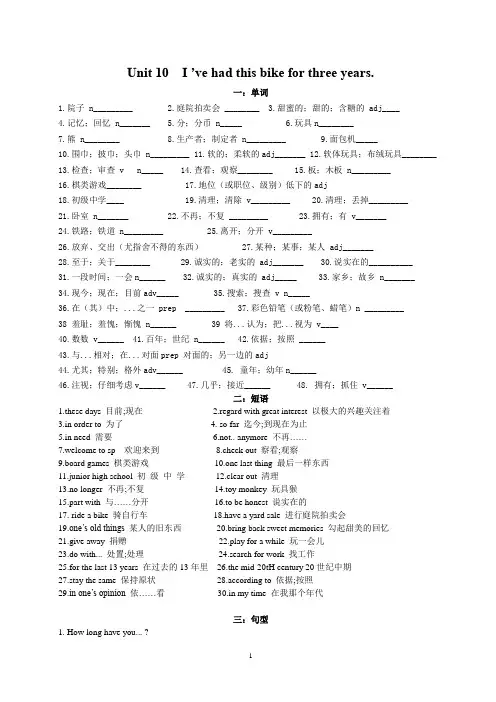
Unit 10 I ’ve had this bike for three years.一:单词1.院子 n_________2.庭院拍卖会 ________3.甜蜜的;甜的;含糖的 adj____4.记忆;回忆 n_______5.分;分币 n_____6.玩具n________7.熊 n________ 8.生产者;制定者 n_________ 9.面包机_____10.围巾;披巾;头巾 n_________ 11.软的;柔软的adj_______ 12.软体玩具;布绒玩具________ 13.检查;审查 v n_____ 14.查看;观察________ 15.板;木板 n_________16.棋类游戏________ 17.地位(或职位、级别)低下的adj18.初级中学____ 19.清理;清除 v_________ 20.清理;丢掉_________21.卧室 n_______ 22.不再;不复 _________ 23.拥有;有 v_______24.铁路;铁道 n_________ 25.离开;分开 v_________26.放弃、交出(尤指舍不得的东西) 27.某种;某事;某人 adj_______28.至于;关于________ 29.诚实的;老实的 adj_______ 30.说实在的__________31.一段时间;一会n______ 32.诚实的;真实的 adj_____ 33.家乡;故乡 n_______34.现今;现在;目前adv_____ 35.搜索;搜查 v n_____36.在(其)中;...之一 prep _________ 37.彩色铅笔(或粉笔、蜡笔)n _________38 羞耻;羞愧;惭愧 n______ 39 将...认为;把...视为 v____40.数数 v______ 41.百年;世纪 n______ 42.依据;按照 ______43.与...相对;在...对面prep 对面的;另一边的adj44.尤其;特别;格外adv______ 45. 童年;幼年n______46.注视;仔细考虑v______ 47.几乎;接近______ 48. 拥有;抓住 v______二:短语1.these days 目前;现在2.regard with great interest 以极大的兴趣关注着3.in order to 为了4. so far 迄今;到现在为止5.in need 需要6.not.. anymore 不再……7.welcome to sp_ 欢迎来到8.check out 察看;观察9.board games 棋类游戏10.one last thing 最后一样东西11.junior high school 初级中学12.clear out 清理13.no longer 不再;不复14.toy monkey 玩具猴15.part with 与……分开16.to be honest 说实在的17. ride a bike 骑自行车18.have a yard sale 进行庭院拍卖会19.one’s old things 某人的旧东西20.bring back sweet memories 勾起甜美的回忆21.give away 捐赠22.play for a while 玩一会儿23.do with... 处置;处理24.search for work 找工作25.for the last 13 years 在过去的13年里26.the mid-20tH century 20世纪中期27.stay the same 保持原状28.according to 依据;按照29.in one’s opinion 依……看30.in my time 在我那个年代三:句型1. How long have you... ?How long have you had that bike over there?那边的那辆自行车你买了多久了?2. Sb. has/have done sth. for...Amy has had her favorite book for three years.艾米拥有她最喜欢的书3 年了。
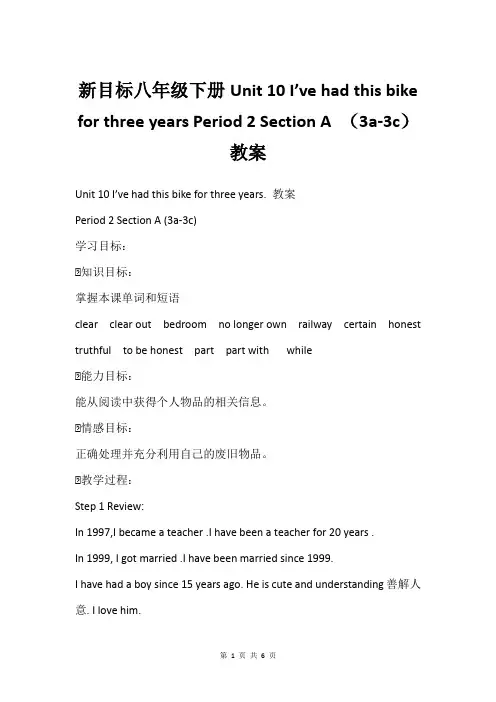
新目标八年级下册Unit 10 I’ve had this bike for three years Period 2 Section A (3a-3c)教案Unit 10 I’ve had this bike for three years. 教案Period 2 Section A (3a-3c)学习目标:★知识目标:掌握本课单词和短语clear clear out bedroom no longer own railway certain honest truthful to be honest part part with while★能力目标:能从阅读中获得个人物品的相关信息。
★情感目标:正确处理并充分利用自己的废旧物品。
★教学过程:Step 1 Review:In 1997,I became a teacher .I have been a teacher for 20 years .In 1999, I got married .I have been married since 1999.I have had a boy since 15 years ago. He is cute and understanding善解人意. I love him.In our home ,we have owned these things for a long time .As for (至于)me ,I love these things ,because they are beautiful . but they make our home crowded and small . To be honest老实说,I no longer不再play them.米国的庭院买卖YARD SALE,米国人周六在门口摆一牌子,YARD SALE,就可出售自家的东西。
……You’re going to have a yard sale.Collect all your old things and think about:A: Which one will you give away B: ….A: Why B: ….A: Which one will you keep B: ….A: Why B: ….Step 2 Group work:When do people usually have yard salesWhat kinds of things do people sell in a yard saleWhy do people like to have a yard saleStep 3 Fast reading work on 3aRead the article written by a father for a newspaper. What is his family going to sell at the yard saleKeys Son : a train and railway set; the toy monkeyDaughter: certain toysFather: football shirtsCareful reading: Read the passage and choose true (T) or false (F).1. My daughter is 15 and my boy has already started junior high school.2. Our house really get smaller.3. My son was quite sad at first.4. My daughter felt happy to part with certain toys.5. I want to give up my football shirts.Keys: FFTFTStep 4 Work on 3bRead the article again and answer the questions.1. Why did they decide to have a yard saleBecause the father’s children get bigger and their house seems to get smaller.2. What do they want to do with the money from the saleThey want to give the money to a children’s home.3. Why does the son want to keep his train and railway setBecause he has owned it since his fourth birthday, and he played with it almost every week until he was about seven.4. How can the old toys be useful againThey can be sold to the people who need them.5. Have you ever thought about having a yard sale to sell your things What would you do with the money you raiseYes, I have. I would give it to the charityStep 5 Work on 2cStep 6 Language points1. My daughter is 16 and my boy is already in junior high school.high school为“中学”,为了避免high school可能形成的误解,还用junior和senior两词来区分初、高中,将“初中”称作junior high或junior high school;“高中”称作senior high或senior high school。
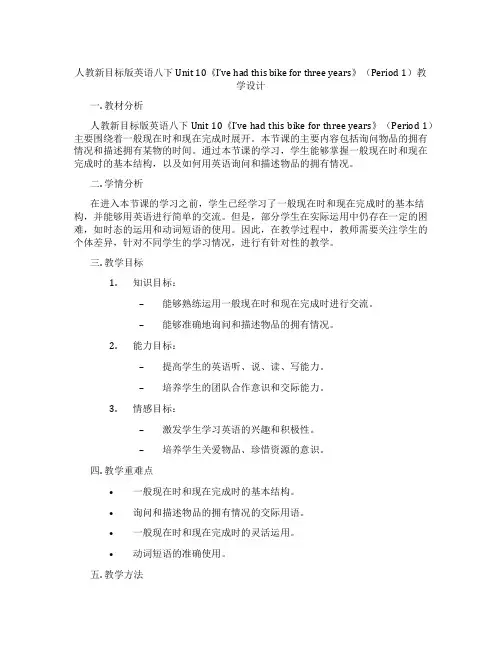
人教新目标版英语八下Unit 10《I’ve had this bike for three years》(Period 1)教学设计一. 教材分析人教新目标版英语八下Unit 10《I’ve had this bike for three years》(Period 1)主要围绕着一般现在时和现在完成时展开。
本节课的主要内容包括询问物品的拥有情况和描述拥有某物的时间。
通过本节课的学习,学生能够掌握一般现在时和现在完成时的基本结构,以及如何用英语询问和描述物品的拥有情况。
二. 学情分析在进入本节课的学习之前,学生已经学习了一般现在时和现在完成时的基本结构,并能够用英语进行简单的交流。
但是,部分学生在实际运用中仍存在一定的困难,如时态的运用和动词短语的使用。
因此,在教学过程中,教师需要关注学生的个体差异,针对不同学生的学习情况,进行有针对性的教学。
三. 教学目标1.知识目标:–能够熟练运用一般现在时和现在完成时进行交流。
–能够准确地询问和描述物品的拥有情况。
2.能力目标:–提高学生的英语听、说、读、写能力。
–培养学生的团队合作意识和交际能力。
3.情感目标:–激发学生学习英语的兴趣和积极性。
–培养学生关爱物品、珍惜资源的意识。
四. 教学重难点•一般现在时和现在完成时的基本结构。
•询问和描述物品的拥有情况的交际用语。
•一般现在时和现在完成时的灵活运用。
•动词短语的准确使用。
五. 教学方法1.情境教学法:通过设定真实的生活情境,让学生在实际语境中学习、运用英语。
2.任务型教学法:引导学生参与各种任务,提高学生的实际运用能力。
3.交际法:鼓励学生进行互动交流,培养学生的交际能力。
4.游戏教学法:运用游戏激发学生的学习兴趣,提高课堂活力。
六. 教学准备1.教师准备:–教材、教案、课件等教学资料。
–实物物品(如自行车、手机等)用于展示和交流。
2.学生准备:–预习相关词汇和语法知识。
–准备好自己的物品,用于课堂交流。
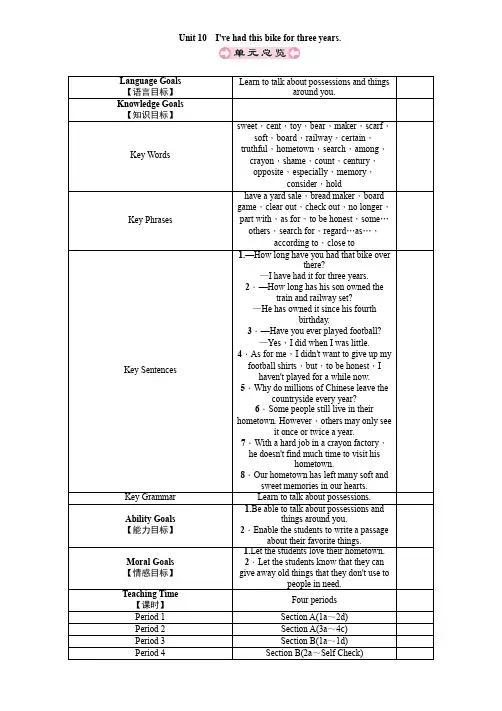
Unit 10I've had this bike for three years.Language Goals 【语言目标】Learn to talk about possessions and thingsaround you.Knowledge Goals 【知识目标】Key Words sweet,cent,toy,bear,maker,scarf,soft,board,railway,certain,truthful,hometown,search,among,crayon,shame,count,century,opposite,especially,memory,consider,holdKey Phraseshave a yard sale,bread maker,board game,clear out,check out,no longer,part with,as for,to be honest,some…others,search for,regard…as…,according to,close toKey Sentences 1.—How long have you had that bike overthere?—I have had it for three years. 2.—How long has his son owned thetrain and railway set?—He has owned it since his fourthbirthday.3.—Have you ever played football?—Yes,I did when I was little. 4.As for me,I didn't want to give up my football shirts,but,to be honest,I haven't played for a while now. 5.Why do millions of Chinese leave the countryside every year?6.Some people still live in their hometown. However,others may only see it once or twice a year. 7.With a hard job in a crayon factory,he doesn't find much time to visit hishometown.8.Our hometown has left many soft and sweet memories in our hearts.Key Grammar Learn to talk about possessions.Ability Goals 【能力目标】1.Be able to talk about possessions andthings around you. 2.Enable the students to write a passage about their favorite things.Moral Goals 【情感目标】1.Let the students love their hometown. 2.Let the students know that they can give away old things that they don't use topeople in need.Teaching Time【课时】Four periods Period 1 Section A(1a~2d)Period 2 Section A(3a~4c)Period 3 Section B(1a~1d)Period 4 Section B(2a~Self Check)第1课时 Section A (1a ~2d )类别课时要点 重点单词yard(n .)院子sweet(adj .)甜的;含糖的cent(n .)分;分币 toy(n .)玩具 bear(n .)熊maker(n .)生产者;制造者 scarf(v .)围巾;披巾;头巾 soft(adj .)软的;柔软的 board(n .)板;木板 check(v .)检查;审查 重点词组yard sale 庭院拍卖会 give away 捐赠 not …any more 不再……a couple of 几个 check out 察看;观察重点句式Jeff has had his bike for more than 10 years. 杰夫买这辆自行车有十多年了。
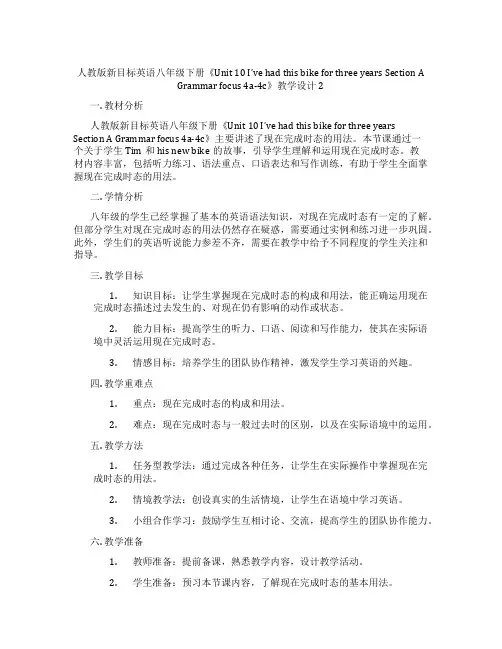
人教版新目标英语八年级下册《Unit 10 I’ve had this bike for three years Section AGrammar focus 4a-4c》教学设计2一. 教材分析人教版新目标英语八年级下册《Unit 10 I’ve had this bike for three years Section A Grammar focus 4a-4c》主要讲述了现在完成时态的用法。
本节课通过一个关于学生Tim和 his new bike的故事,引导学生理解和运用现在完成时态。
教材内容丰富,包括听力练习、语法重点、口语表达和写作训练,有助于学生全面掌握现在完成时态的用法。
二. 学情分析八年级的学生已经掌握了基本的英语语法知识,对现在完成时态有一定的了解。
但部分学生对现在完成时态的用法仍然存在疑惑,需要通过实例和练习进一步巩固。
此外,学生们的英语听说能力参差不齐,需要在教学中给予不同程度的学生关注和指导。
三. 教学目标1.知识目标:让学生掌握现在完成时态的构成和用法,能正确运用现在完成时态描述过去发生的、对现在仍有影响的动作或状态。
2.能力目标:提高学生的听力、口语、阅读和写作能力,使其在实际语境中灵活运用现在完成时态。
3.情感目标:培养学生的团队协作精神,激发学生学习英语的兴趣。
四. 教学重难点1.重点:现在完成时态的构成和用法。
2.难点:现在完成时态与一般过去时的区别,以及在实际语境中的运用。
五. 教学方法1.任务型教学法:通过完成各种任务,让学生在实际操作中掌握现在完成时态的用法。
2.情境教学法:创设真实的生活情境,让学生在语境中学习英语。
3.小组合作学习:鼓励学生互相讨论、交流,提高学生的团队协作能力。
六. 教学准备1.教师准备:提前备课,熟悉教学内容,设计教学活动。
2.学生准备:预习本节课内容,了解现在完成时态的基本用法。
3.教学素材:准备与课文相关的图片、视频等教学资源。
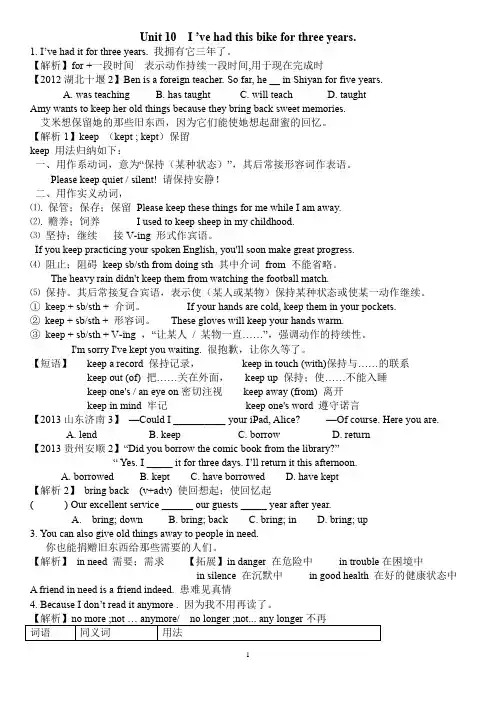
Unit 10 I ’ve had this bike for three years.1. I’ve had it for three years. 我拥有它三年了。
【解析】for +一段时间表示动作持续一段时间,用于现在完成时【2012湖北十堰2】Ben is a foreign teacher. So far, he __ in Shiyan for five years.A. was teachingB. has taughtC. will teachD. taughtAmy wants to keep her old things because they bring back sweet memories.艾米想保留她的那些旧东西,因为它们能使她想起甜蜜的回忆。
【解析1】keep (kept ; kept)保留keep 用法归纳如下:一、用作系动词,意为“保持(某种状态)”,其后常接形容词作表语。
Please keep quiet / silent! 请保持安静!二、用作实义动词,⑴. 保管;保存;保留Please keep these things for me while I am away.⑵. 赡养;饲养I used to keep sheep in my childhood.⑶坚持;继续接V-ing 形式作宾语。
If you keep practicing your spoken English, you'll soon make great progress.⑷阻止;阻碍keep sb/sth from doing sth 其中介词from 不能省略。
The heavy rain didn't keep them from watching the football match.⑸保持。
其后常接复合宾语,表示使(某人或某物)保持某种状态或使某一动作继续。
①keep + sb/sth + 介词。
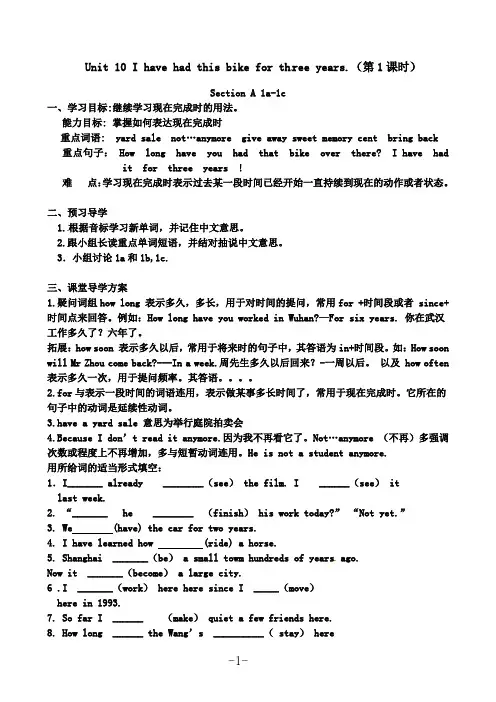
Unit 10 I have had this bike for th ree years.(第1课时)Section A 1a-1c一、学习目标:继续学习现在完成时的用法。
能力目标: 掌握如何表达现在完成时重点词语: yard sale not…anymore give away sweet memory cent bring back 重点句子: How long have you had that bike over there? I have had it for three years !难点:学习现在完成时表示过去某一段时间已经开始一直持续到现在的动作或者状态。
二、预习导学1.根据音标学习新单词,并记住中文意思。
2.跟小组长读重点单词短语,并结对抽说中文意思。
3.小组讨论1a和1b,1c.三、课堂导学方案1.疑问词组how long 表示多久,多长,用于对时间的提问,常用for +时间段或者 since+时间点来回答。
例如:How long have you worked in Wuhan?—For six years. 你在武汉工作多久了?六年了。
拓展:how soon 表示多久以后,常用于将来时的句子中,其答语为in+时间段。
如:How soon will Mr Zhou come back?---In a week.周先生多久以后回来?-一周以后。
以及 how often表示多久一次,用于提问频率。
其答语。
2.for与表示一段时间的词语连用,表示做某事多长时间了,常用于现在完成时。
它所在的句子中的动词是延续性动词。
3.have a yard sale 意思为举行庭院拍卖会4.Because I don’t read it anymore.因为我不再看它了。
Not…anymore (不再)多强调次数或程度上不再增加,多与短暂动词连用。
He is not a student anymore.用所给词的适当形式填空:1.I_______ already ________(see) the film. I ______(see) itlast week.2. “_______ he ________ (finish)his work today?” “Not yet.”3. We (have) the car for two years.4. I have learned how (ride) a horse.5. Shanghai _______(be) a small towm hundreds of years ago.Now it _______(become) a large city.6 .I _______(work) here here since I _____(move)here in 1993.7. So far I ______ (make) quiet a few friends here.8. How long ______ the Wang’s __________( stay) here四、合作探究,课堂练习根据汉语意思完成句子,每空一词1.我买这个背包已经有十多年了。
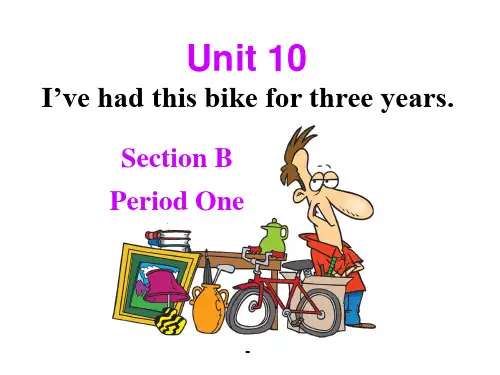
Unit 10 part A 教案【教学目标】Knowledge objectiveGet the students to be able to know the new words and expressions they learnt in this part能听懂谈论人们拥有某物多长时间的话题,能熟练运用since, for 谈论自己的个人物品【教学重点】get information from the textlearn new words and expressions【教学难点】consolidate the new words and expressionsarise discussion and guide students to ask questions and find answers on their own 【教学方法】PWP method, task-based method and interactive approach【教学手段】A tape recorder, multimedia and some pictures【教学过程】Teaching Procedures:Step 1 Leading-inSs look the pictures and answer the questions. say as much as possible.Step 2 Pair workWork on 2c. Student A is Amy’s mom, Student B is Amy. Make new conversations according to 2c.Step 3 2d Role play the conversationLet the students read 2d, then role play the conversations in pairs.Step 4 Language points1. --How long have you had that bike there?--I have had it for three years辨析:how long, how soon, how often, how farHow long 多久,多长(时间)。
人教新目标版英语八下Unit 10《I’ve had this bike for three years》(Period 2)教学设计一. 教材分析人教新目标版英语八下Unit 10《I’ve had this bike for three years》(Period 2)的主要内容包括:一般过去时的疑问句和否定回答,以及一般过去时的There be句型。
本节课的主要目的是让学生掌握一般过去时的疑问句和否定回答,以及一般过去时的There be句型,能够运用所学知识描述过去发生的事情。
二. 学情分析经过对人教新目标版英语七下的学习,学生们已经掌握了一般过去时的一般疑问句和回答,以及There be句型。
但是,对于将一般过去时用于There be句型,以及如何正确运用否定回答,还有一定的困难。
因此,在教学过程中,需要针对这些困难进行讲解和操练。
三. 教学目标1.能够运用一般过去时提问,并使用否定回答。
2.能够运用一般过去时的There be句型描述过去的事情。
3.能够提高听、说、读、写的能力,提高语言运用能力。
四. 教学重难点1.一般过去时的疑问句和否定回答。
2.一般过去时的There be句型的运用。
五. 教学方法采用任务型教学法,情境教学法,分组合作学习法,以学生为主体,教师为指导,通过任务驱动,情境创设,分组合作,引导学生主动探究,主动参与,提高学生的学习兴趣和学习积极性。
六. 教学准备1.教学PPT。
2.教学卡片。
3.教学录音机。
4.与本节课相关的图片。
七. 教学过程1.导入(5分钟)利用图片引导学生回顾一般过去时的一般疑问句和回答,以及There be句型。
然后,提问学生:“你们有没有想过,过去的事情可以用一般过去时来描述,那么There be句型可以用一般过去时来表达吗?”2.呈现(10分钟)教师通过PPT呈现一般过去时的疑问句和否定回答,以及一般过去时的There be句型。
同时,引导学生注意一般过去时的疑问句和否定回答的构成。
Unit 10 I’ve had this bike for three years.1.yard 院子2.sweet 天的3.cent 分4.toy 玩具5.bear 熊6.maker 生产者7.scarf 围巾8.soft 软的9.board 木板10.check 检查11.railway 铁路12.certain 某种,某人13.honest 诚实的14.truthful 真实的15.hometown 家乡16.search 搜查17.among 在(其中);......之一18.shame 羞耻19.regard 将......认为20.count 数数21.century 百年22.opposite 对面的23.especially 尤其24.memory 记忆25.consider 注视26.hold 拥有;抓住1.these days 目前;现在2.regard with great interest 以极大的兴趣关注着3.in order to 为了4.so far 迄今;到现在为止5.in need 需要6.not.. anymore 不再……7.welcome to sp_ 欢迎来到… :8.check out 察看;观察9.board games 棋类游戏10.one last thing 最后一样东西11.junior high school 初级中学12.clear out 清理13.no longer 不再;不复14.toy monkey 玩具猴15.part with 与……分开16.to be honest 说实在的17.ride a bike 骑自行车18.have a yard sale 进行庭院拍卖会19.one’s old things 某人的旧东西20.bring back sweet memories 勾起甜美的回忆21.give away 捐赠22.play for a while 玩一会儿23.do with... 处置;处理24.search for work 找工作25.for the last 13 years 在过去的13年里26.the mid-20th century 20世纪中期27.stay the same 保持原状28.according to 依据;按照29.in one’s opinion 依……看30.in my time 在我那个年代1.I’ve had it for three years. 我买它三年了。
2.How long has his son owned the train and railway set? 他儿子拥有轨道火车多长时间了?3.He’s owned it since his fourth birthday. 自从他四岁生日时,他就已经拥有他了。
1. How long have you... ?How long have you had that bike over there?那边的那辆自行车你买了多久了?2. sb. has/have done sth. for...Amy has had her favorite book for three years.艾米拥有她最喜欢的书3 年了。
3. sb. has/have done sth. since...He’s owned it since his fourth birthday.自他4 岁生日起,他拥有这个东西了。
4. Some… Others...Some people still live in their hometown. How-ever, others may only see it once or twice a year.有些人仍然住在家乡。
然而,另一些人可能一年只能回家乡一两次。
5. As for me, I did not want to give up my footballshirts, but, to be honest,I have not played for a while now.至于我,我不想放弃我的足球衣。
但是,说实在的,我现在巳经有一段时间没有踢(足球)了。
6. Have you ever thought about having a yard sale tosell your things?你是否曾经想过要举办一个庭院拍卖会来出售东西?7. What would you do with the money you raise?你会怎么处理你所筹集到的钱?现在完成时常与“for+时间段”或“since+时间点”连用。
1.for 作介词,后接时间段,表示“某个动作持续了多久。
Eg:I’ve been here for just over two years. 我来到这儿刚好两年多了。
2.since 可作介词,后接时间点,也可用作连词,后接从句,表示某个动作或情况从过去某一时间点一直持续到现在,从句用一般过去时。
Eg:He’s been here since two years ago. 他两年来一直住在这儿。
注意:for 和since引导的时间状语不能与终止性动词的肯定式连用,但可和其否定式连用。
Eg:Mr Smith hasn’t come to China for three years. 史密斯先生三年没来中国了。
I haven’t seen him since I came back. 自从我回来就没见过他。
针对性训练:用for 或since填空1.She has been ill ________ more than to two weeks.2.I haven’t met him __________ a long time.3.Mary has been here ___________ eight o’clock this morning.4.It hasn’t rained ____________ two months ago.5.They have been my friends _________I was a child.1.check out意为”价差;审查”,为动副结构,是及物动词短语。
You’d better check out your engine. 你最好检查一下你的发动机。
拓展:check out 还可为不及物动词短语,意为“结账离开”。
Eg:他十分钟前付清费用离开了。
注意:check out 也有“检查,核对”之意,但是强调查明真相,核对事实。
在美式英语中常用check upon。
2.So we’ve been clearing out a lot of things from our bedrooms for a yard sale.这是一个现在完成进行时的句子。
现在完成进行时通常要和时间段连用,表示在某段时间内,某动作一直在进行,结构为“have/has been+v-ing +时间段”。
Eg:The workers have been working for three hours. 这些工人已经工作3个小时了。
注意:如果对时间段提问,疑问短语用how long。
如对上面例句中的for短语进行提问:How long have the workers been working? 这些工人工作多长时间了?clear out 意为“清理,收拾干净,清除掉”。
Eg: I decided to clear out all the old shoes that we never wear. 我已经决定把我们从来不穿的旧鞋统统加以清除。
思考:你知道clear out与clean out 的用法区别吗?clear out与clean out这两个短语都有“使......干净”的意思,但实际意思是不同的,前者意为“使......被清除掉,使.....空出来”。
而clean out则是“使......清洁”之意。
Eg:I’ll clear out that closet and then you can hang your clothes in there. 我会把衣橱腾出来,你就可以放衣服了。
Be sure to clean out the kitchen when you finish cooking. 做晚饭时,一定要把厨房收拾干净。
3.part with 意为“舍弃,放弃(对......的占有);卖掉(东西)”。
Eg:He was very sorry to part with his favorite horses. 他卖掉他最喜欢的几匹马,心里很难过。
思考:你知道part from与part with的用法区别吗?part from 的意思是“分开,离开”,多用于人;part with=give up,是“卖掉,放弃,断绝关系,跟......分开”的意思,主要用于物,间或也可用于人。
part from 作“分手,分开”讲时,是瞬间动词,不能表示“持久”的意思,from后接表示人的名词活代词。
Eg:I often part from my parents after breakfast. 我常在早饭后与父母分手。
Tom has parted with Jane. 汤姆已和詹妮分手。
4.as for 是一个固定短语,意为“至于......;关于......”往往用于说话时提及的另一个人或事,活实物的另一个方面,其后可跟名词、代词或动名词作宾语。
Eg:As for that computer. I’m not telling you anything. 至于说哪台电脑,我什么都不会告诉你。
5.to be honest意为“老实说;说实在的”,相当于to tell you the truth或honestly speaking, 常在句中作插入语。
Eg:To be honest, I have little money. 老实说,我几乎没有钱。
6.do with意为“处理”,常与what连用,表示询问。
Eg:What are you going to do with your old clothes? 你打算怎么处理你的旧衣服?拓展:deal with意为“解决,应付,处理”,期中deal为动词,过去式为dealt,with为介词,后面常接trouble,problem等词。
deal with多与how 连用,表示询问。
Eg:How did you deal with your book?7.the same as 意为“和......一样”短语中的as是介词,用于比较,后接名词、代词或动名词。